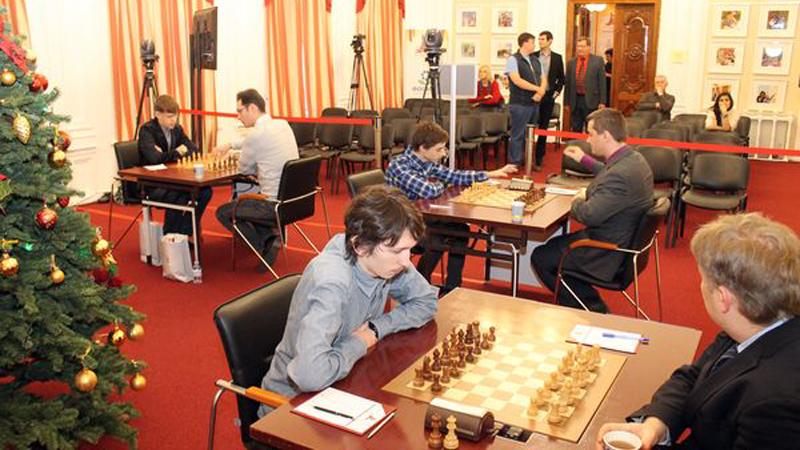
Nutcracker: Kings, Princes Still Equal; Rapid Follows
Despite eight decisive games, the score is still equal at the Nutcracker Match of the Generations after four rounds of classical chess.
In the third round, the “Kings” took the lead once more with a 2.5-1.5 win, but the next day the “Princes” leveled the score again.
The four Russian talents can be satisfied about the first part of the Nutcracker tournament.
After four rounds of classical chess, the score is 16-16 (with two points for a win and one for a draw!) and that's certainly a fine result.
On Monday, Shirov improved his score to 2.5/3 as he beat Oparin in a 6.h3 Najdorf.
Somehow the opening didn't go very well for Black because his h-pawn wasn't well placed on h5, and there was no counterplay against the white queenside majority. Just when Black had blocked everything with an exchange sac, things went wrong on the other side of the board.

The other three games in round three ended in draws. One of these was a quick and spectacular encounter:


All rounds finished at 2.5-1.5 and each team was on the winning side twice.
On Tuesday, the Princes won, with two wins and one loss. Fedoseev was the first to bring down Shirov, in a line that had also appeared between Giri and Shirov in October in Hoogeveen.
In this game Shirov was doing very well, but just before the time control he collapsed:

Dubov defeated Dreev in a Slav Catalan, and his mini-plan after the opening is very instructive.
When White has pushed e4-e5 like that, and Black doesn't have a knight defending his king, it is sometimes very strong to simply put up a battery on the b1-h7 diagonal, and that's exactly what happened.

Morozevich-Artemiev was just as instructive because there a very common rook endgame appeared on the board: three vs three on the kingside, and one passer on the queenside.
Black had his rook behind the pawn, which should have been enough to draw, but some of his moves were not really to the point.
Morozevich nicely prevented Black's most important idea in this ending: to create a passed pawn on the kingside. That plan of pushing g4 and h4-h5 is worth remembering as a winning attempt.

And so three players finished this part of the tournament with a plus score: Alexander Morozevich, Alexei Shirov and Vladimir Fedoseev all ended on 2.5/4.
Grigoryi Oparin and Daniil Dubov scored 50 percent and Alexei Dreev, Peter Leko and Vladislav Artemiev ended on minus one.
Nutcracker 2014
| Dubov | Fedoseev | Oparin | Artemiev | Kings | ||
| Shirov | 2-0 | 0-2 | 2-0 | 1-1 | 5 | |
| Leko | 1-1 | 0-2 | 1-1 | 1-1 | 3 | |
| Morozevich | 1-1 | 2-0 | 0-2 | 2-0 | 5 | |
| Dreev | 0-2 | 1-1 | 1-1 | 1-1 | 3 | |
| 16 | ||||||
| Princes | 4 | 5 | 4 | 3 | 16 |

The Nutcracker tournament is held in the Botvinnik Chess Club in Moscow. A team of experienced GMs, called the “Kings,” plays a team of up-and-coming talents, called “Princes.” Each player on one team plays each player on the other team.
The classical chess is over; now two days of rapid chess (December 24-25) will follow.
For winning a classical game a player got two points, for a draw one point, and for a loss zero points. In the rapid section the score will be normal. Draw offers before move 40 are not allowed.
The games are transmitted live online at the Russian Chess Federation website and there's also a live video stream with commentary in Russian.
Previous report


